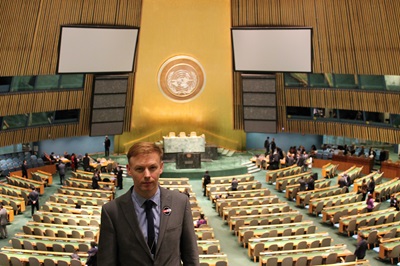History was made today at the United Nations as governments began to sign an Arms Trade Treaty designed to protect millions of people living in daily fear of armed violence and at risk of rape, assault, displacement and death.
The Arms Trade Treaty, the first internationally binding agreement to regulate the £56bn annual trade in arms and ammunition, will be signed by many of the world’s top arms exporters including the UK, Germany and France, alongside emerging exporters such as Brazil and Mexico. The United States Government is expected to sign later this year.
More than 500,000 people are killed by armed violence every year.
Scots father David Grimason has been a supporter of the Control Arms movement since his two-year-old son Alistair was killed during a family holiday in Turkey almost 10 years ago.
Alistair was asleep in his pram in a cafe when an argument broke out at a nearby table and a man, armed with an illegal gun, opened fire, killing the toddler from East Kilbride.
David, who now lives in Aberdeen, has travelled to Kenya with Oxfam to witness the destruction arms have caused there, and has also attended key negotiations at the UN to lobby for an Arms Trade Treaty.
Last month he was thanked for his years of campaigning on the issue by Scottish Secretary Michael Moore on behalf of the UK Government, at a special event in Edinburgh.
David Grimason said: “After a decade of campaigning by people all around the world, the moment has finally arrived when countries can sign up to the Arms Trade Treaty and commit to a future where weapons will be properly regulated for the first time.
” After a decade of campaigning by people all around the world, the moment has finally arrived when countries can sign up to the Arms Trade Treaty and commit to a future where weapons will be properly regulated for the first time.
“Without this Treaty, it is easier to trade in guns and bullets than bananas, but that can change after today. The more countries that sign the Treaty, the stronger and more effective it will be. Every minute at least one person dies from armed violence. Millions more are injured or displaced from their homes.
“My son was killed by a man with an illegal gun and everyone who loved him has suffered a terrible loss. But today, if governments ratify the Arms Trade Treaty, we can begin the process of establishing a robust global law that will save lives and prevent further suffering.”
Eight of the most violence-affected countries in the world will also sign the Arms Trade Treaty, making it more difficult for illicit arms to cross their borders. Conflict-wracked countries such as the Democratic Republic of Congo and South Sudan will lead the way in endorsing the Treaty in an effort to protect millions of people displaced from their homes due to armed violence.
The Control Arms Coalition, representing more than 100 civil society groups including Oxfam, has campaigned for the treaty for a decade and says that those who sign today should immediately adhere to its standards. This will mean conducting full risk assessments on each arms transfer before it takes place, with governments being required to assess the risk of weapons or ammunition falling into the wrong hands or being used to commit human rights violations.
Anna Macdonald, Head of Arms Control at Oxfam, said: “The signing of the Arms Trade Treaty gives hope to the millions affected by armed violence every day. Gunrunners and dictators have been sent a clear message that their time of easy access to weapons is up. For generations the arms trade has been shrouded in secrecy but from now on it will be open to scrutiny.
” The signing of the Arms Trade Treaty gives hope to the millions affected by armed violence every day. Gunrunners and dictators have been sent a clear message that their time of easy access to weapons is up. For generations the arms trade has been shrouded in secrecy but from now on it will be open to scrutiny.
“The devastating humanitarian consequences of the current conflict in Syria underline just how urgently regulation of the arms trade is needed.
“This treaty now makes governments take responsibility for every arms transfer that enters or leaves their territory, and requires they put human rights and humanitarian law, not profit, at the heart of every decision. Too many lives have been lost to armed violence – today’s ceremony marks a new dawn.”
Baffour Amoa, President of West African Action Network on Small Arms said: “States that have championed the treaty for close to a decade need to show leadership by signing and ratifying the treaty as quickly as possible. We urge all countries to pass national law that will enforce the treaty.
” States that have championed the treaty for close to a decade need to show leadership by signing and ratifying the treaty as quickly as possible. We urge all countries to pass national law that will enforce the treaty.
“Today, the first day of the treaty becoming a reality takes us one step closer to tackling attacks against civilians and sexual violence in Africa such as eastern Congo, where millions have seen their lives torn apart by conflict.”
On 2 April 2013, after a decade of campaigning by activists, the United Nations General Assembly voted overwhelmingly in favour of a treaty that will for the first time regulate the international transfer of weapons and ammunition.
When the campaign for an Arms Trade Treaty was first launched by the Control Arms campaign more than a decade ago, only three countries – Mali, Costa Rica and Cambodia – supported the treaty. It took 10 years of dogged pressure by campaigners around the world to persuade more than 150 countries to adopt a legally binding agreement on the most dangerous commodities in the world.
